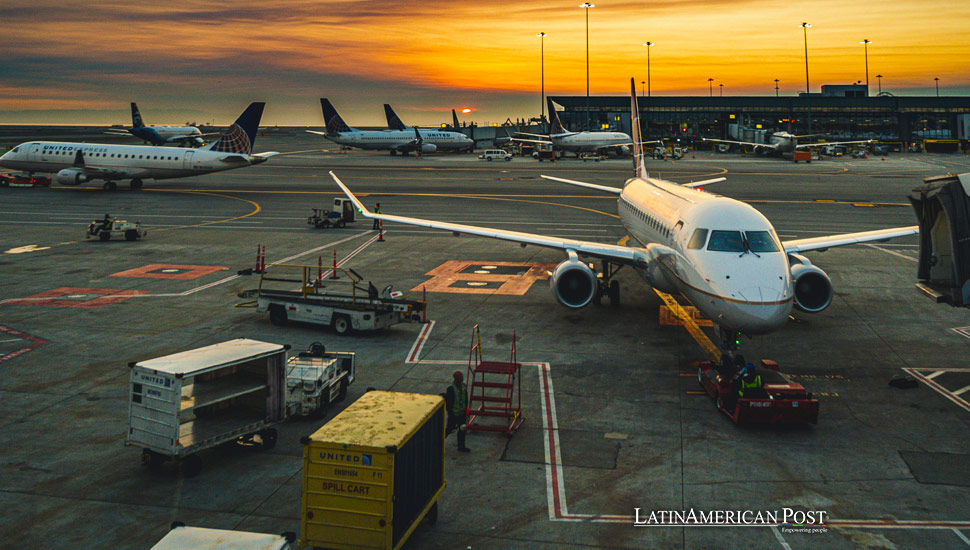Judicial uncertainty and high costs deter foreign airlines from Brazil

Complicated market conditions, including judicial uncertainty and high fuel prices, have prevented foreign airlines from launching operations in Brazil despite regulatory changes aimed at fostering competition, according to Airbus executive Gilberto Peralta in an interview with Reuters.
Complicated market conditions, including judicial uncertainty and high fuel prices, have prevented foreign airlines from launching operations in Brazil despite regulatory changes aimed at fostering competition, according to Airbus executive Gilberto Peralta in an interview with Reuters.
In 2018, Brazil overturned rules that limited the stake a foreign investor could hold in an airline, hoping to open up competition among carriers in Latin America’s largest economy. However, Brazil’s market share is still largely dominated by Azul, Gol, and LATAM, the latter resulting from a merger between local airline TAM and Chile’s LAN in the 2010s.
In a recent interview, Airbus executive Gilberto Peralta highlighted that international airlines’ reluctance to enter Brazil is primarily due to judicial uncertainty and high fuel prices. “Capital barriers are gone; a foreigner could set up a company in Brazil, but they don’t… It’s a lot of trouble,” he said.
One significant barrier to entry is Brazil’s strong consumer protection laws, which make it relatively easy for passengers to sue airlines for various issues, including delayed or canceled flights. This judicial environment creates a high legal risk for airlines, deterring many from entering the market.
“The number of legal actions taken by Brazilian customers against airlines is high,” Peralta noted, adding that this creates uncertainty that many international carriers find unmanageable.
Another critical factor deterring foreign airlines is Brazil’s high fuel costs. Late last year, the International Air Transport Association (IATA) urged Petrobras, the state-run oil company, to reduce fuel costs, calling kerosene prices in Brazil “excessively high.” Although Petrobras announced that jet fuel prices have fallen 8.8% in 2024, the overall cost remains a significant hurdle.
Airbus’ Role in the Brazilian Market
Airbus has a notable presence in Brazil, with orders from Azul and LATAM totaling more than 100 aircraft in the coming years. Globally, Airbus aims to increase its production capacity from 60-65 aircraft per month to 75 by late 2025 or early 2026.
Peralta also commented on the quality crisis faced by competitor Boeing, which has caused delays in aircraft deliveries. “I’m sure they’ll fix it… that’s not good for the market, as it creates insecurity and generates concern among users,” he said.
Brazil’s aviation sector presents a mix of significant challenges and potential opportunities. While regulatory changes have theoretically opened the market, practical barriers such as judicial uncertainty and high operational costs continue to stymie competition.
The Impact of Judicial Uncertainty
Brazil’s robust consumer protection laws are designed to safeguard passengers but also contribute to a challenging environment for airlines. The ease with which passengers can sue airlines for delays and cancellations leads to a high volume of legal cases, creating significant financial and operational risks for carriers.
This judicial uncertainty is a significant deterrent for foreign airlines considering entering the Brazilian market. The potential for frequent and costly legal battles makes the market less attractive compared to other regions with lower legal risks.
High fuel prices in Brazil are another critical barrier. Despite recent reductions, fuel costs remain substantially higher than in many other markets. This is partly due to the high taxes imposed on aviation fuel in Brazil, which significantly increase airlines’ operational expenses.
The IATA’s call for Petrobras to lower fuel prices underscores the importance of competitive fuel costs in attracting and retaining airlines. However, without substantial and sustained reductions, high fuel costs will continue to pose a significant challenge.
Airbus’ Strategy and Market Position
Airbus’ substantial order backlog in Brazil reflects the country’s ongoing demand for new aircraft. Despite the challenges, Azul and LATAM have committed to expanding their fleets, indicating confidence in the market’s potential.
Peralta’s optimism about resolving Boeing’s quality issues highlights the competitive nature of the global aviation industry. Stability and reliability in aircraft manufacturing are crucial for maintaining market confidence and ensuring timely deliveries.
For foreign airlines, entering the Brazilian market involves weighing the potential for growth against the inherent risks. While regulatory changes have removed capital barriers, the practical challenges of high operational costs and judicial uncertainty remain significant.
Foreign airlines considering entry into Brazil must develop robust strategies to navigate the complex market conditions. This may involve partnerships with local carriers, focusing on niche markets, leveraging technology to enhance operational efficiency and customer service, and engaging with industry associations and government bodies to advocate for regulatory reforms that reduce operational costs and legal risks.
Forming alliances with established Brazilian airlines can help mitigate some of the risks associated with market entry. Partnerships can provide local market knowledge and operational synergies that reduce costs and enhance service delivery.
Targeting underserved routes or niche markets within Brazil can provide opportunities for growth without directly competing with the dominant carriers. This approach allows foreign airlines to establish a foothold and gradually expand their presence.
Investing in technology to enhance operational efficiency and customer service can mitigate some challenges posed by high costs and strong consumer protections. Advanced analytics and customer relationship management systems can improve decision-making and customer satisfaction.
Engaging with industry associations and government bodies to advocate for regulatory reforms that reduce operational costs and legal risks can create a more favorable environment for all airlines operating in Brazil.
Navigating a Complex Market
Brazil’s aviation market presents a paradox: significant potential for growth tempered by substantial challenges. The removal of capital barriers has opened the door for foreign airlines. Still, judicial uncertainty and high operational costs continue to be formidable obstacles.
Airbus’ strong presence in Brazil and the ongoing demand for new aircraft reflect the market’s potential. However, foreign airlines must develop strategies to navigate the complex landscape to successfully enter and compete in Brazil.
By focusing on partnerships, niche markets, technology, and regulatory advocacy, foreign airlines can find pathways to success in Brazil. The market’s future will depend on airlines’ ability to adapt to local conditions and leverage opportunities for growth while managing the inherent risks.
Also read: Brazilian Women Protest Bill Equating Abortion to Homicide
The coming years will be critical in determining whether Brazil can attract more foreign carriers and increase competition in its aviation sector. With continued efforts to address the underlying challenges, Brazil’s aviation market can become a dynamic and competitive environment that benefits passengers and airlines alike.





